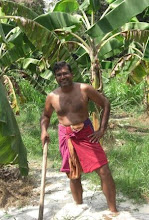
I was pleasantly surprised that someone within the CIC agribusiness division was alerted to my blog entry as a dissatisfied outgrower for them, as can be seen below dated October 4th. I was contacted by the person who I had accused of not visiting my fields. He had assured me that he had visited when my person on the property was not there, and also that prior to this season he had visited and given advice on planting. He also further reported that has been in telephone contact with my man giving him advice on a regular basis for problems that have cropped up from time to time in relation to growing issues, both in paddy cultivation and in other areas.
His boss had come down hard on him and so he wanted me to set the record straight in the matter. So he had been given a copy of the blog entry and we had a pretty lengthy conversation on each of the points raised with his side of the story.
I did try and remind him that this is part of an agricultural blog that merely expresses my personal opinions on agricultural issues I face without trying to gloss over anything, and at times my version may not appear to tie in with the version that the other party at whom an accusation is made comes up with. It would be nice if he could make a comment in the comment section so his point of view can also get a hearing to balance any perceived bias.
My whole aim in this blog is to engage in discussion with the sole purpose of improving the productivity of my agricultural enterprise and that of others as well so that the country can at a minimum produce twice the current output with little extra effort, except to use improved techniques and methods of agriculture. I have a lot to learn and I want to learn from others experiences, just as I would like others to learn from mine so we don’t have to re invent the wheel, and instead are able to work together. The important thing to note is that we are not competing with each other as we are producing such small quantities ourselves and the competition we face are from overseas competitors of similar products like apples and oranges that currently are even cheaper than fruit grown in Sri Lanka.
I am one of the smallest most inefficient producers of agricultural produce, but the variety of my produce, and the direct to customer distribution and sale makes me the only one in Sri Lanka today who grows both in the dry and wet zones, a reasonably diverse range of products that I directly sell to my customers on home delivery on Mondays. The experience of survival this has given me through an incredible level of suffering over the past 5 years cannot be appreciated by a small farmer or an administrator not tasked with this multi- disciplinary work load.
